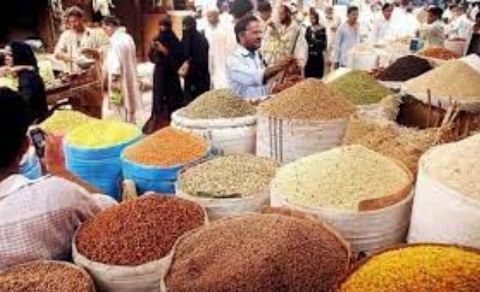Pakistan’s inflation rate stayed above target at 27.4 per cent in August, data showed on Friday, as reforms set out as conditions for an IMF loan complicate the task of keeping price pressures and declines in its rupee currency in check.
According to data released by the Pakistan Bureau of Statistics (PBS), food inflation remained elevated at 38.5pc year-on-year.
Economic stabilisation is a top challenge for the country as it embarks on a narrow recovery path after a $3 billion IMF bailout averted a sovereign debt default.
Reforms linked to the bailout, including an easing of import restrictions and a demand that subsidies be removed, have already fuelled annual inflation. Interest rates have also risen, and the rupee hit all-time lows. Last month the currency fell 6.2pc.
The August data from PBS showed a slight easing from July’s 28.3pc inflation rate, but food inflation remained elevated at 38.5pc with the year-on-year increase in non-perishable food items at 42.79pc and 12.69pc for perishable food items.
Annual consumer inflation in urban and rural areas increased to 25pc and 30.9pc year-on-year, respectively.
Meanwhile, the highest year-on-year increase was recorded in the categories of alcoholic beverages and tobacco (97.51pc), recreation and culture (61.38pc), non-perishable food items and furnishing and household equipment maintenance (41.71pc).
Index-wise increase in inflation YoY (in descending order)
Alcoholic beverages and tobacco: 97.51pc
Recreation and culture: 61.38pc
Non-perishable food items: 42.79pc
Furnishing and household equipment maintenance: 41.71pc
Miscellaneous goods and services: 40.84pc
Restaurants and hotels: 34.06pc
Transport: 22.96pc
Health: 22.55pc
Clothing and footwear: 18.46pc
Perishable food items: 12.69pc
Education: 10.47pc
Communication: 7.03pc
Housing and utilities: 6.25pc
Meanwhile, in the food group, items whose prices increased the most in urban areas for August compared to last year were:
Cigarettes: 117.48pc
Wheat flour: 99.68pc
Tea: 94.5pc
Condiments and spices: 75.14pc
Sugar: 70.64pc
Chicken: 67.56pc
Rice: 66.82pc
Wheat: 64.17pc
Potatoes: 59.71pc
Wheat Products: 59.03pc
Beans: 50.36pc
Dry fruits: 48.8pc
Beverages: 46.43pc
Milk powder: 44.39pc
Pulse Mash: 32.4pc
Milk products: 31.49pc
Fresh milk: 29.25pc
Pulse Moong: 27.59pc
Tomatoes: 23.17pc
Whole gram: 16.56pc
Cooking oil: 3.45pc
Pulse Gram: 2.35pc
The year-on-year increase for non-food items was:
Gas charges: 62.82pc
Household equipment: 40.3pc
Motor vehicle accessories: 34.67pc
Solid fuel: 33.27pc
Newspapers: 32.77pc
Personal grooming services: 31.32pc
Furniture and furnishing: 28.2pc
Mechanical services: 27.68pc
Accommodation services: 27.18pc
Construction input items: 26.55pc
Motor fuel: 21.02pc
Dental services: 10.9pc
Postal services: 9.13pc
House rent: 5.25pc
Liquified hydrocarbons: 3.69pc
Authorities raised petrol and diesel prices to record highs on Friday. The worsening economic conditions, along with rising political tensions, have triggered sporadic protests.
The Jamaat-i-Islami has called for a countrywide strike on Saturday in response to higher power tariffs. Ordinary citizens say they are struggling to make ends meet.
Bank employee Waseem Ahmed, speaking at a petrol station in Islamabad, said the middle classes were being crushed.
“More than 60 to 70pc of my salary is spent on bills and petrol. Where will we get basic staples from? This is why people are contemplating suicide,” he told Reuters.
Mohammed Sohail, CEO of Topline Securities, said August’s inflation reading was in line with expectations.
But the falling rupee and rising energy prices meant that “we may not see a big decline in inflation year on year as was expected earlier”, he added.
He was referring to government projections that inflation will fall to 22pc by the end of the fiscal year that runs to June 31 while analysts had predicted inflation to range from 26pc to 28pc.
The State Bank said in its last monetary policy statement in July — when it held benchmark interest rates likewise at 22pc — that it expected inflation to remain on a downward path over the following 12 months.

















